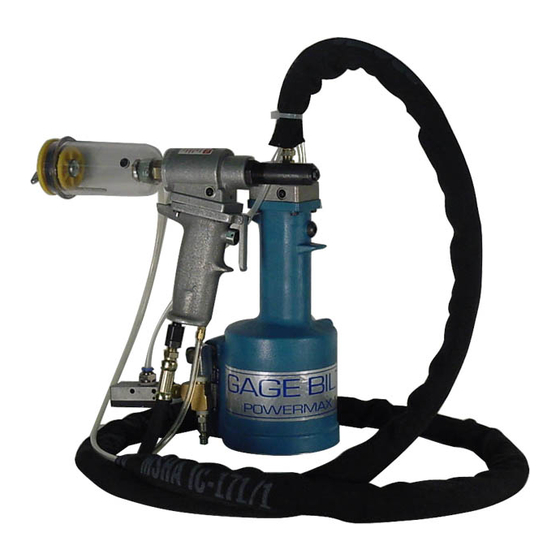Gage Bilt GB734SHV Manual - Page 5
Browse online or download pdf Manual for Rivet Tools Gage Bilt GB734SHV. Gage Bilt GB734SHV 13 pages. Installation tool

FILLING & BLEEDING PROCEDURE:
NOTE:
Air Bleeder Assy (704153) and Fill Bottle (745263) are required.
NOTE:
To replace a small amount of oil follow BLEEDING steps 5-6.
WARNING:
Do not cycle tool without air bleeder assy (704153), or the screw and stat-o-seal, installed in tool head. Severe personal injury could result.
CAUTION:
Before filling handle assy (744129), air piston assy (744121) should be all the way down.
CAUTION:
When forcing piston rod assembly (744136) downward, with head cylinder assembly (734104) removed, hydraulic oil will eject forcibly
from handle assy (744129).
CAUTION:
When bleeding tool, ensure tubing (703582) & (703589) (see pg#10) are free from kinks or other obstructions.
CAUTION:
Use CAUTION when removing screws, air bleeder assy (704153) and fill bottle (745263). Hydraulic oil may be under pressure.
IMPORTANT:
Be sure to use thread sealant on all hydraulic fittings, Loctite® 30534 or similar Teflon® infused pipe dope is recom
mended.
CAUTION:
hydraulic system and cause malfunction and damage. Use 1 1/2 wraps of tape on each thread. Cut off all loose tape
ends. Tighten until fitting feels snug and then go 1/2 to a full turn past that point.
easily distort the threads.
* FILLING & BLEEDING VIDEO AVAILABLE AT: www.gagebilt.com/bleeding.htm
FILLING:
1.
Remove manifold-handle (744303), o'ring (S832), button head cap screws (A-928) and gasket (704129) from handle assy (744129). Put
the piston rod wrench (704149) into the top of handle assy (744129), pushing down firmly until piston rod assy (744136) is completely in
the down position.
CAUTION:
When forcing piston rod assembly downward, with head cylinder assy removed, hydraulic oil will eject forcibly from handle assy.
2.
Fill oil passage and reservoir with Automatic Transmission Oil Dexron III or equivalent. The reservoir is the area surrounding
the power cylinder (743131). When looking at the top of the handle assy (744129), the oil passage is the hole that has a counter-
`bore for o'ring (S832). Do not overfill causing oil to go in air passage hole.
3.
Re-install o'ring (S832), gasket (704129), button head cap screws (A-928) and manifold-handle (744303) to handle assy (744129)
keeping hydraulic hose (A-317) towards plug (704313). Torque button head cap screws (A-928) to 40 inch lbs.
4.
Push piston (734107) full forward. Install gasket (704129), o'ring (S832) and socket head cap screws (400061) on split handle
(700323) and torque socket head cap screws (400061) to 40 inch lbs. Assemble head cylinder assy (734104) to split handle
(700323). Apply Loctite 242 to all socket head cap screws and torque all screws to manual specifications. (See pg.#4).
5.
Remove actuator lever assy (704312) from split handle (700323).
side so that the hole marked #3 on manifold-handle (744303) is to the top. Set head cylinder assy (734104) over a small bucket or
can. Completely fill bottle (745263).
6.
Remove button head cap screw (402482) and stat-o-seal (S572) from manifold-handle (744303) hole #3. Connect fill bottle 745263) to manifold-
handle (744303) hole marked #3. Remove button head cap screw (402482) and stat-o-seal (S572) from head cylinder assy (734104).
7.
In one continuous squeeze force oil into manifold-handle (744303) until oil starts to flow from bleeder hole on head cylinder assy
(734104). While still squeezing the fill bottle (745263) use other hand to replace button head cap screw (402482) and stat-o-seal (S572) on
head cylinder assy (734104) and torque to 35-40 inch lbs. This may require two people.
8.
Remove fill bottle (745263) and replace stat-o-seal (S572) and button head cap screw (402482) on manifold-handle (744303) and
torque to 35-40 inch lbs.
BLEEDING:
1.
Ensure actuator lever assy (704312) is removed from split handle (700323).
lic hose (A-317) and head cylinder assy (734104) upward and lay flat on a table or bench. When bleeding tool always keep the
head cylinder assy (734104) higher than the handle assy (744129).
2.
Remove button head cap screw (402482) and stat-o-seal (S572) from manifold-handle (744303). Attach air bleeder assy (704153) to mani-
fold-handle (744303) hole marked #3 in an upright position.
3.
Connect the tool to air supply and cycle tool 10 times holding the air actuator assy (704130) down for 2-3 seconds between cy-
cles to remove any air from the tool.
4.
Disconnect air supply. Remove air bleeder assy (704153) from manifold-handle (744303) and replace with button head cap screw
(402482) and stat-o-seal (S572) and torque to 35-40 inch lbs.
5.
Remove button head cap screw (402482) and stat-o-seal (S572) from head cylinder assy (734104) and attach air bleeder assy (704153) in
an upright position.
6.
Connect air supply. Cycle tool 10 times removing any air bubbles.
7.
Disconnect air supply. Remove air bleeder assy (704153) and replace button head cap screw (402482) and stat-o-seal (S572) and torque to 35-40 inch lbs.
8.
Connect air supply. Cycle tool 5-6 times and check stroke of 1.060" (26.9 mm) (see diagram below). We recommend using a pair
of dial calipers. With the air actuator assy released, check dimension (A). Holding air actuator assy, check dimension (B). If
stroke is not consistent within 1/64" (.0156) repeat bleeding steps 5-6.
9.
Re-attach actuator lever assy (704312) to split handle (700323).
Teflon tape is an excellent thread sealer. If it not properly applied, however, pieces may enter the
1.140 (28.9mm)
Coil tool up on bench and lay handle assy (744129) down on
Stand handle assy (744129) on floor, stretch hydrau
"B"
.080 (2.0mm)
5
CAUTION:
Over tightening can
3/12 REV 9/14
